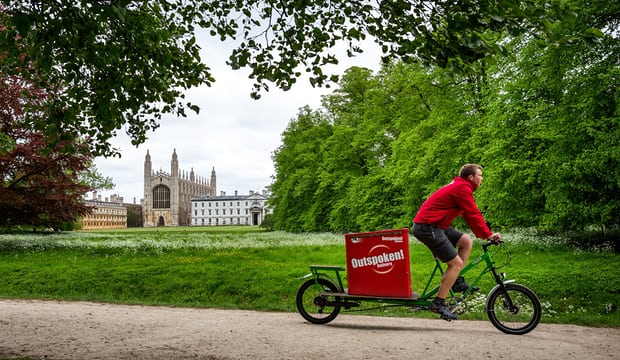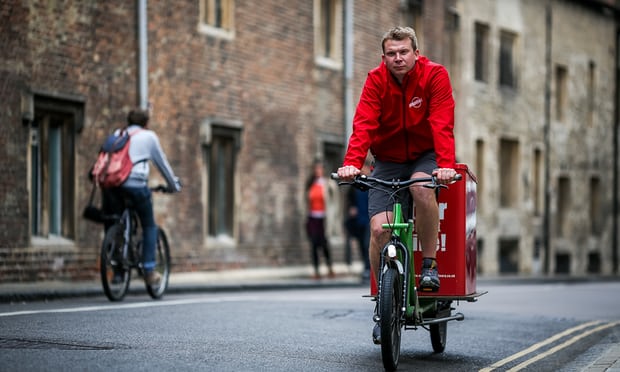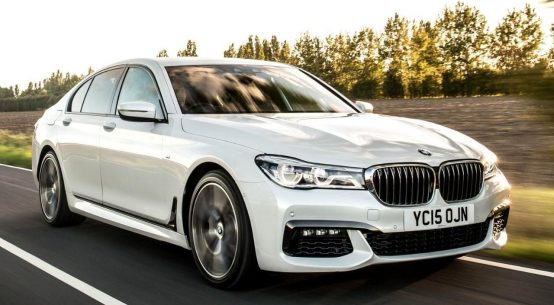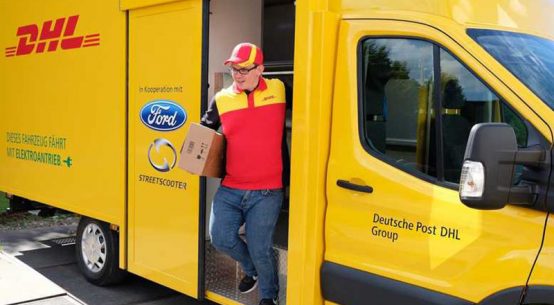
An Outspoken delivery rider in Cambridge. Photograph: Paul Rogers for the Guardian
Eco-friendly cycle logistics firms are popping up across the UK, carrying everything from Amazon packages to takeaway food and bouquets
London (The Guardian) – Ben Cartwright is amid a ritual familiar to thousands of delivery workers across the country, carefully loading up dozens of packages before starting off on his city-wide route. There’s one difference: rather than a van, the 29-year-old is filling a large box on a cargo bike.
“It’s really easy to ride,” he says of the two-wheeled, tandem-length machine, with the lidded container positioned between the saddle and the rear wheel. “You get used to it pretty quickly, and it’s still small enough to filter through traffic.”
Imagine your ad placed here
Cartwright, who recently completed a Ph.D. in archaeology at Cambridge University, has spent the past eight months piloting the unusual contraption through the city for Outspoken Delivery, one of a fast-growing breed of logistics companies eschewing the motor vehicle in favour of pedal power.
Outspoken’s fleet comprises around a dozen cargo bikes and trikes of various sizes, going up to behemoths able to carry loads of more than 200kg, some with a small electric motor helping the rider set off from lights or negotiate Cambridge’s very occasional slight hills.
Rob King, the founder, said it was initially a struggle to persuade customers to sign up: “We’d go into companies and say, ‘We could do these deliveries.’ They’d say, ‘Don’t be ridiculous, you’re on bikes.’”
Outspoken, whose riders wear uniforms and take the Bikeability training scheme, now has a big client list, including sub-contracted work from major freight companies, as well as new outlets in Glasgow and Norwich.

The obvious point with cargo bikes is that they are not meant as a complete replacement for the truck or van. Cargo bikes would struggle to take washing machines, let alone a sofa, and can’t shuttle big loads between nationwide depots. Where they come into their own is the so-called last mile deliveries, particularly the vast number of smaller packages from online purchases.
They are especially effective in compact, congested towns and cities, where a cargo bike rider, unworried by parking tickets and able to use bike-only routes, can often deliver more packages in a day than their van-driving equivalent, even with the smaller payload requiring occasional returns to the depot.
This is all the more so in places such as Cambridge, where parts of the centre are closed to cars and vans. And of course, cargo bikes are nearly emission-free and much safer for a city’s inhabitants.
There are cargo bike delivery firms in about a dozen places around the UK, and much more across continental Europe, carrying everything from Amazon packages to office stationery to takeaway food.
There is even an EU-funded project, Cycle Logistics, seeking to boost the trade. Susanne Wrighton from Forschungsgesellschaft Mobilität, a Vienna-based mobility thinktank involved in Cycle Logistics, says her city has a successful startup delivering healthy meals with a fleet of branded cargo bikes. A takeaway food enterprise in Prague promises its bikes can deliver the dish of choice within seven minutes of order.
There is more to the fast growth of the industry than convenience, says Wrighton: “It’s also a matter of more and more cities recognizing that this can really improve the quality of life for people who live in the city.”
Aside from a generally bike-unfriendly road culture, the UK industry was also impeded by regulations meaning heavier cargo bikes fitted with electric assistance were classified as motor vehicles.
This restriction was lifted in April, although the electric motors remain small – a maximum of 250w power – and limited to 15mph. Outspoken is now awaiting delivery of a vast, electric-assisted cargo trike with a three cubic-metre cargo box, almost as large as a small van.
An electric boost is even more of a boon in hilly towns and cities. Staff at ReCharge, a courier company launched in Brighton by another former Ph.D. student, Sam Keam, in 2013, use electrically-assisted bikes to deliver goods ranging from sub-contracted DHL packages to bottles from a wine merchant.
While local companies enjoy the green cachet of using cargo bikes, said Keam, for bigger clients it is convenience that counts: “We’re seeing growth in parts of the British economy, retail is moving online and the number of deliveries being made is going through the roof. But there’s no road space for that to happen. The only way you can grow urban economies is by changing the way you manage logistics in a city.”
Deliveries by bike are, of course, a longstanding urban phenomenon, with cycle couriers a familiar sight in many big cities for decades. But as fax and then email have hacked away at this trade other businesses are stepping in.
At the start of this year Richa Bhalla, a 27-year-old former tech industry worker, launched Petal and Cycle, a florist that promises to deliver bouquets to addresses in central London addresses by bike within 90 minutes.
Customers enjoy both the immediacy and the method, Bhalla said: “It’s nice to have this human contact. There’s a kind of symbolism to it, kind of like this knight in shining armour, pedaling across the city to bring you flowers.”
Follow us on TWITTER for more Logistics News Follow us on FACEBOOK for more Logistics News
One company, however, remains missing: Royal Mail. The UK’s biggest parcel deliverer of all has phased out almost all its familiar delivery bikes, replacing them with vans and trollies. The company says it has tried cargo bikes but found none “capable of meeting our needs”.
As well as the shift from letters to parcels, Royal Mail also stopped using bikes over safety fears. That is perhaps another lesson for the cargo bike industry: it might only become completely mainstream when more areas become cycle friendly.








